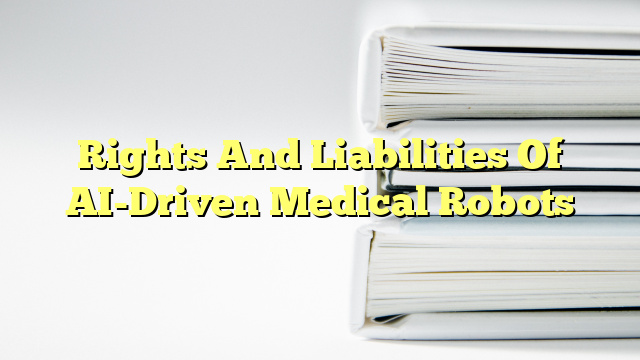Table of Contents
Liabilities of AI in Healthcare
AI-driven medical robots have the potential to revolutionize healthcare by improving accuracy, efficiency, and patient outcomes. However, with this advancement comes the need to address the liabilities associated with these technologies.
One major liability is the potential for errors or malfunctions in the AI algorithms that drive these robots. If a robot makes a mistake in diagnosing or treating a patient, who is responsible? Is it the manufacturer of the robot, the healthcare provider using the robot, or the AI algorithm itself?
Another liability is the potential for privacy breaches. AI robots collect and analyze vast amounts of patient data, raising concerns about data security and patient confidentiality. If a robot’s database is hacked and patient information is compromised, who is liable for the breach?
Furthermore, there is the liability of informed consent. Patients must be fully informed about the use of AI-driven robots in their care and have the right to refuse treatment by a robot if they wish. Healthcare providers must ensure that patients understand the risks and benefits of AI technology and obtain their consent before using it.
Legal Issues with AI Robotics
The use of AI robotics in healthcare also raises several legal issues. One such issue is liability for medical malpractice. If a patient is harmed as a result of a robot’s actions, who can be held legally responsible? The manufacturer, the healthcare provider, or both?
Another legal issue is the regulation of AI robotics. As these technologies become more prevalent, there is a need for clear guidelines and standards to ensure their safe and ethical use. Regulatory bodies must establish rules for the development, testing, and deployment of AI-driven medical robots.
Intellectual property rights are also a concern in the field of AI robotics. Who owns the AI algorithms that power these robots? Can they be patented or copyrighted? These questions need to be addressed to encourage innovation while protecting the rights of developers.
Risks of AI in Healthcare
While AI-driven medical robots offer many benefits, they also come with risks. One major risk is the potential for bias in AI algorithms. If the algorithms are trained on biased data, they may perpetuate and amplify existing healthcare disparities.
Another risk is the overreliance on AI technology. Healthcare providers may become too dependent on robots and neglect their own clinical judgment. This could lead to errors or missed diagnoses if the AI algorithms are not perfect.
Additionally, there is the risk of job displacement. As AI robots become more advanced, they may replace certain healthcare professionals, leading to unemployment and job insecurity.
Ethical Issues with AI in Healthcare
The use of AI in healthcare raises important ethical considerations. One such consideration is the issue of patient autonomy. Should patients have the right to refuse treatment by a robot and demand human care instead? This raises questions about the role of AI in decision-making and the importance of human interaction in healthcare.
Another ethical issue is transparency. AI algorithms can be complex and difficult to understand, making it challenging for patients and healthcare providers to fully comprehend how decisions are being made. There is a need for transparency in AI technology to ensure accountability and trust.
Furthermore, there is the ethical dilemma of prioritizing patient well-being versus cost-effectiveness. AI robots may be more efficient and cost-effective, but they may not always prioritize the best interests of the patient. Balancing these competing interests is a complex ethical challenge.
Conclusion
The use of AI-driven medical robots in healthcare holds great promise, but it also comes with rights and liabilities that need to be addressed. From liabilities in case of errors or privacy breaches to legal issues

